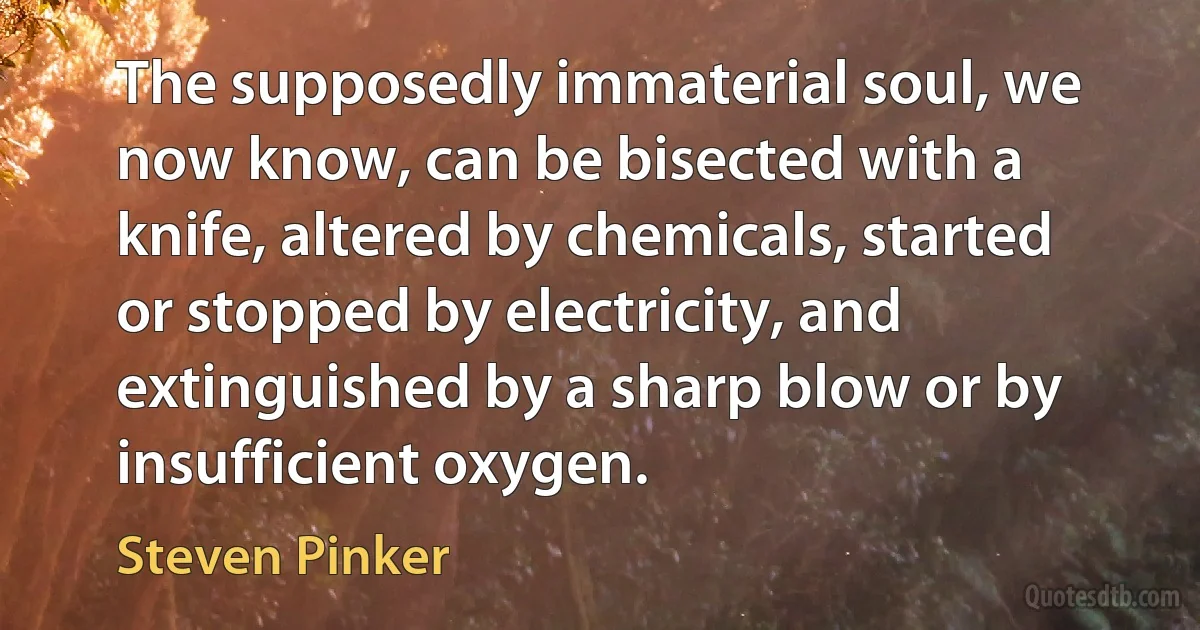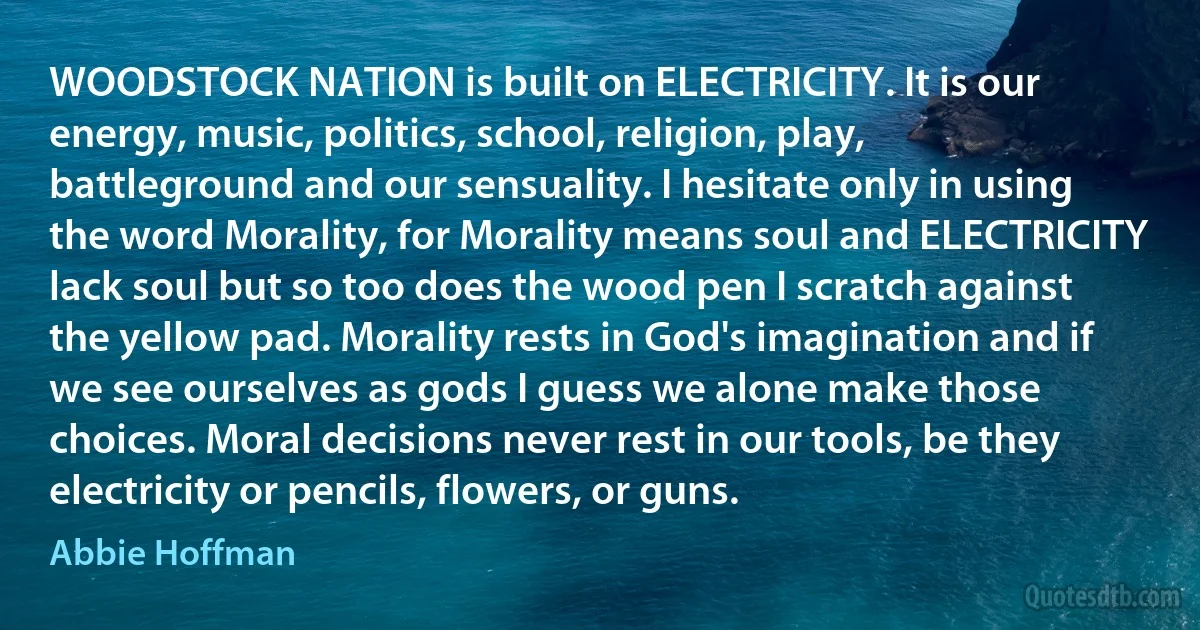Electricity Quotes - page 4
Ether is, in effect, a merely hypothetical entity, valuable only in so far as it explains that which by means of it we endeavor to explain - light, electricity, or universal gravitation - and only so far as these facts cannot be explained in any other way. In like manner the idea of God is also an hypothesis, valuable only in so far as it enables us to explain that which by means of it we endeavor to explain - the essence and existence of the Universe - and only so long as these cannot be explained in any other way. And since in reality we explain the Universe neither better nor worse with this idea than without it, the idea of God, the supreme petitio principii, is valueless.

Miguel de Unamuno
The boy watches his father cross the road and thinks there is something about the way his dad moves through the world that is truly impressive. Cars screech to a halt, drives shake their fists and stick their heads out the windows and curse and blow their horns and Bunny walks on as if radiating some super-human force field, like he has walked off the pages of a comic book. The world can't touch him. He seems to be the grand generator of some hyper-powerful electricity.

Nick Cave
Terry Pratchett and I met in February 1985, in a Chinese restaurant. I was a young journalist. He was a former journalist and Electricity Board PR, and a writer who had just published his second Discworld novel. I was the first journalist who had ever interviewed him.
I remember we made each other laugh a lot. We laughed at the same things. We became friends. It was easy.

Neil Gaiman
Science Of Energetics. Although the mechanical hypothesis just mentioned may be useful and interesting as a means of anticipating laws, and connecting the science of thermodynamics with that of ordinary mechanics, still it is to be remembered that the science of thermodynamics is by no means dependent for its certainty on that or any other hypothesis, having been now reduced, to a system of principles, or general facts, expressing strictly the results of experiment as to the relations between heat and motive power. In this point of view the laws of thermodynamics may be regarded as particular cases of more general laws, applicable to all such states of matter as constitute Energy, or the capacity to perform work, which more general laws form the basis of the science of energetics, - a science comprehending, as special branches, the theories of motion, heat, light, electricity, and all other physical phenomena.

William John Macquorn Rankine
We had a large old-fashioned battery, a wet cell, in the kitchen, hooked up to an electric bell. The bell was too complicated to understand at first, and the battery, to my mind, was more immediately attractive, for it contained an earthenware tube with a massive, gleaming copper cylinder in the middle, immersed in a bluish liquid, all this inside an outer glass casing, also filled with fluid, and containing a slimmer bar of zinc. It looked like a miniature chemical factory of sorts, and I thought I saw little bubbles of gas, at times, coming off the zinc. The Daniell cell (as it was called) had a thoroughly nineteenth-century, Victorian look about it, and this extraordinary object was making electricity all by itself-not by rubbing or friction, but just by the virtue of its own chemical reactions.

Oliver Sacks
Sometimes I'm misunderstood and it's hard to come by that. My life has been full of excitement. I've done pretty much what I wanted to do. I came from the Midwest, from South Dakota, and I came up the hard way. We lived on a farm; we didn't even have electricity or running water if you know what I mean. People don't know what that life is like.

Mamie Van Doren
Let's just grant the possibility that there is a Creator God, who's omniscient, who occasionally authors books. And he's gonna give us a book – the most useful book. He's a loving God, he's a compassionate God, and he's gonna give us a guide to life. He's got a scribe, the scribe's gonna write it down. What's gonna be in that book? I mean just think of how good a book would be if it were authored by an omniscient deity. I mean, there is not a single line in the Bible or the Koran that could not have been authored by a first century person. There is not one reference to anything – there are pages and pages about how to sacrifice animals, and keep slaves, and who to kill and why. There's nothing about electricity, there's nothing about DNA, there's nothing about infectious disease, the principles of infectious disease. There's nothing particularly useful, and there's a lot of iron age barbarism in there, and superstition. This is not a candidate book.

Sam Harris
My mum brought me to my first job when I was 12. I started electrical work at her plant. She was an engineer, a technical expert, at one of the plants in the south, and in the summer she brought me in and I learnt how industrial things work: casting, electricity, maintenance, everything.

Oleg Deripaska
In the interior of the atom, Bohr had tried the plan of retaining the particle-electron and modifying the classical mechanics. Heisenberg took the opposite course, his procedure amounting in effect to retaining the classical mechanics, at least in form, and modifying the electron. Actually, the electron dropped out all together, because it exists only as a matter of inference and not of direct observation. For the same reason, the new theory contains no mention of atoms, nuclei, protons, or of electricity in any shape or form. The existences of all these are matters of inference, and Heisenberg's purely mathematical theory could no more make contact with them than with the efficiency of a turbine or with the price of wheat.

James Jeans
Superficially at least the forces of electricity and magnetism seem to present the same kind of problem as gravitation. Experiment shows that two electrically charged bodies attract one another (or repel if their charges are of the same kind) with a force which conforms to the same mathematical law as the force of gravitation - both forces fall off inversely as the inverse square of the distance. The same is true of the magnetic force also; two magnetic poles attract or repel one another with a force which again follows the law of the inverse square of the distance.

James Jeans



